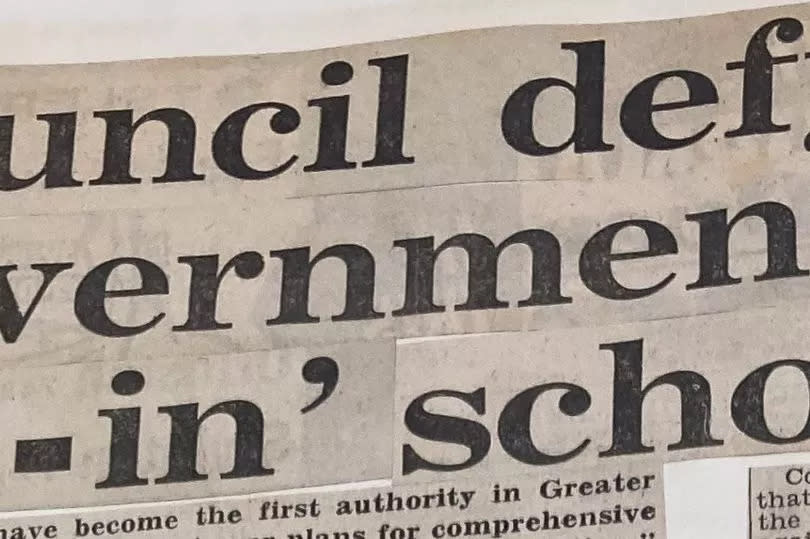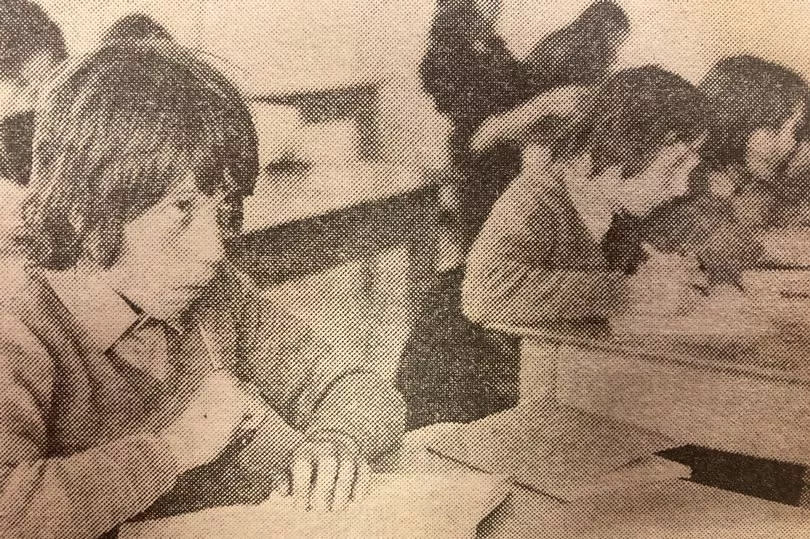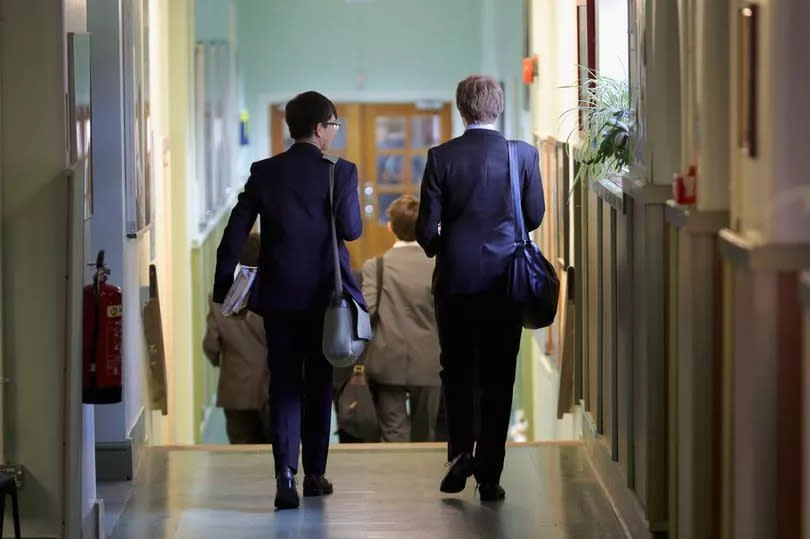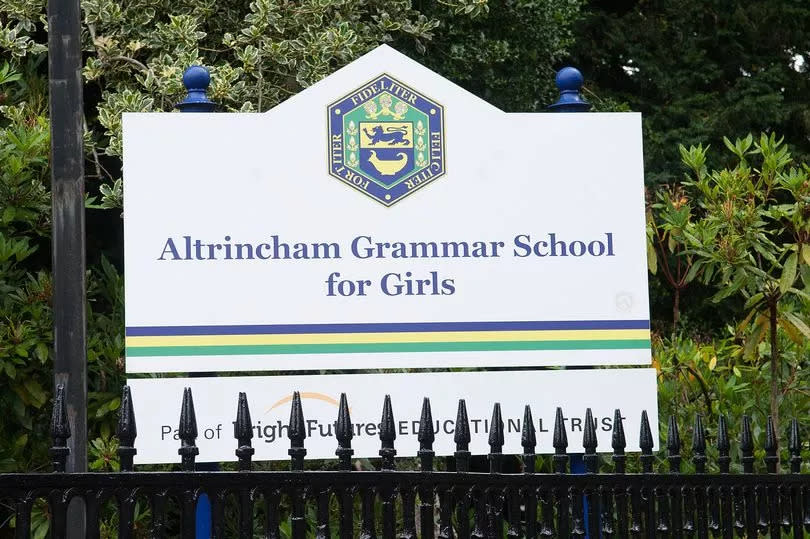The revolt that means one Greater Manchester borough has some of the most sought after schools in the country

The M.E.N recently reported on the scale of demand for high school places in Trafford, the only Greater Manchester borough which still has a state grammar school system decided by the 11-plus exam. Here, the M.E.N's Damon Wilkinson writes about how Trafford came to be the only borough in our region which kept a selective school system which defined post-war Britain - but only survives in a few parts of the country today.
"If it's the last thing I do, I'm going to destroy every f****** grammar school in England." So said Labour Education Secretary Anthony Crossland.
And the architect of comprehensive education was very nearly as good as his word. Between 1971 and 1978 around 650 grammar schools closed.
But a handful of 'rebel' authorities revolted against the changes. Among them - and arguably the most obstinate - was Tory-controlled Trafford council.
READ MORE: Greater Manchester's lost schools - and the stars who went to them
And the consequences of that stance are still being felt today. The fiery debate around grammar schools began to gather steam in 1964 when Harold Wilson's Labour Government vowed to 'get rid of the segregation of children caused by 11-plus selection'.
Opponents argued the system was elitist, entrenched privilege, damaged the children who failed the entrance exams and did nothing to drive up overall standards. But advocates of selection maintained it did improve the calibre of education and also promoted social mobility by providing bright students from modest backgrounds with a way to succeed.
When Trafford council came into being a decade later on April 1, 1974 the row was still raging. Formed out of bits of Lancashire and Cheshire, it was one of the few local education authorities which had to start from scratch with no previous administration to build on.
The town hall was controlled by the Conservatives, who by-and-large were staunch supporters of the 11-plus system and were loath to abandon the eight grammar schools then under their control. So when a working party, set up to consider the future of secondary education in the borough, voted 20 to three in favour of going fully comprehensive the Tories were enraged.
There were similar rumblings of discontent elsewhere, with Tameside council even taking their complaints about the comprehensive system to the High Court. But in March 1975 Trafford became the first council in Greater Manchester to openly defy the government's 'all-in' plans.
At a heated council meeting three attempts to adopt the comprehensive system were voted down. Coun F. Eadie, quoted in the Stretford and Urmston Journal, summed up the Tory position.
"We do not want comprehensive education at any price, in any form," he said. "We are not prepared to be a willing party to destroying good schools we have had for years."

To cries of 'rubbish' from the Labour benches, his colleague Coun A. Coupe backed up that position by quoting the Trafford motto 'Hold fast that which is good'.
On the opposition benches there was barely contained outrage. Labour councillor Richard Mee accused the Conservatives of being 'reactionaries'.
"The present system is just about on its last legs," he said. "The comprehensive system is not destroying the grammar school system; it opens it up to all children."
In May that year the local elections were fought almost entirely on an education ticket. And that's when things got even uglier. The Conservatives were accused of running a 'smear campaign' against comprehensives.
"They indulged in gross exaggerations in order to turn the public against comprehensive schools," said Wally Scott, divisional secretary of the National Union of Teachers and deputy head at Partington Broadoak, then the only school in Trafford that had been converted to a comprehensive.

The Tories were unmoved. After winning 21 of the 22 seats up for grabs they took that as a mandate to dig their heels in even further.
Refusing to bow to pressure from the Government and from their own teachers, the council adopted what The Times Educational Supplement described as an 'unyielding high-Tory approach'.
"Trafford now give the feeling that they have a secondary school reputation they would rather not talk about," the TES wrote after being unable to pin down education bosses at the town hall. "Rather than being openly proud of their grammar schools like Buckinghamshire or Kingston they simply appear to have a dogged determination to dig in."
Fifty years later that rebel stance continues to shape Trafford's education system for good. Just 163 grammar schools remain in England and there has been a ban on opening any new ones since 1998.
Of those seven are in Trafford where there is now a larger proportion of secondary school places in grammar schools than in any other local authority in England. But those seven grammars are renowned as some of the best schools in the north.

In fact Altrincham Grammar School for Girls and Altrincham Grammar School for Boys, were recently named the first and second best state secondary schools in the north west by the Sunday Times. But that quality means demand for places is fierce.
Last year 75.6 per cent of children in the borough got a place at their first choice school, compared to a national average of 82.6%. For children starting high school this September the figure rose to 79% in Trafford.
"The grammar school system doesn't reflect the diversity of the area," Lisa Waterhouse, of Bowdon, one of the organisers of a campaign to expand North Cestrian school, claimed to the Manchester Evening News earlier this month. "Parents are tutoring their kids to within an inch of their lives to get in and you've also got kids coming in from areas outside the borough.
"Then the local kids who don't get into a grammar have to apply for schools in areas that are hugely oversubscribed, so actually you don't have a choice where you go. It's a totally bonkers system."

It's led to accusations of a two-tier education system. According to Comprehensive Future just 4% of pupils at Trafford grammar schools are classed as disadvantaged, compared with 22% in the non-selective schools.
Meanwhile house prices in Trafford are among the highest in the north, partly due to the desire among the middle classes to get their kids a place at one of the grammar schools. And that's having a knock-on effect on teacher recruitment and retention, some believe.
"We're in an area where house prices rival London, but the starting salary for a teacher is £30,000 a year," James Starnes, district secretary for the Trafford branch of the NEU said earlier this month. "One, even two, teacher households just can't afford to live here."
But state grammar schools still retain a lot of support as meritocratic engines of social mobility and excellence in a society still dominated by private school alumni. Among the most high-profile advocates is outgoing Altrincham and Sale West MP Sir Graham Brady.
"Over the years I've debated the benefits of academic selection countless times but, more often than not, I have found myself comparing a modern selective system such as that in my borough of Trafford with historical descriptions of life in the 60s or 70s," the Altrincham Grammar School for Boys old boy wrote in 2022.
"When most places saw good grammar schools and poor secondary moderns, they responded by scrapping the bit of the system that worked. In Trafford we kept the excellent grammar schools and set about improving the high schools as well."
Almost 50 years from the Trafford revolt, neither the debate around selective education nor the grammar schools themselves look like going away any time soon.

 Yahoo News
Yahoo News 
